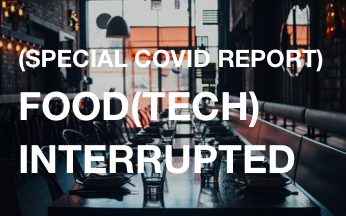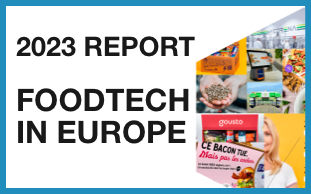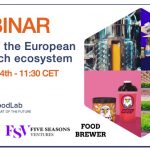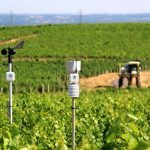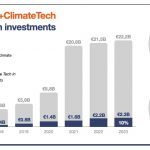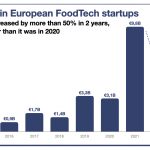Hi,
The weeks (or months) of lockdown have had a lot of positive effects such as putting us back in the kitchen, enabling us to think about the need to build a better future and about the FoodTech trends that will benefit of the COVID-19 crisis. They also added some weight on our wais as many of us have spent (too much) time looking at TikTok videos and cooking eating food (here is the recipe for the famous 3-ingredients peanut butter cookie).
So, we are entering “the world of after”, maybe smarter but certainly larger. As often, we decided to look at “fat” from another angle.
First, we looked at the keto trend, which has surely been one of the hottest food trends in the last five to ten years. We have mapped and categorised some of the most interesting startups of this ecosystem to identify its underlying trends. Basically, Keto is the idea that fat is good and the real enemies are carbohydrates. This trend comes from the ’70s when the low carb Atkins diet started to get famous in the US.
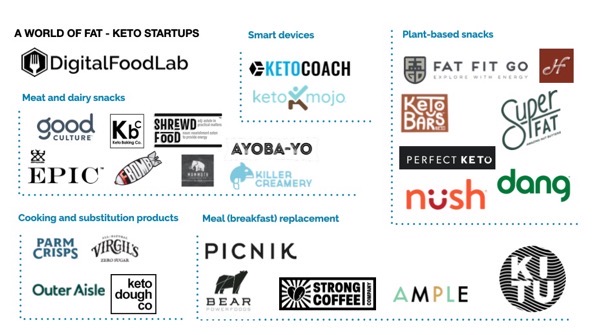
In this mapping and analysis mini-report, we consider the various categories and their potential.
Then, keeping our journey on the world of fat, we crossed the path of Cubiq, a Spanish startup that raised €5M for its lab grow fats. Almost all of the lab-grown ecosystem is concentrated around the reproduction of animal protein. But both dairy and meat are a mixture of proteins and a significant share of fat. Now, both in plant-based products (alternative milk, burgers such as Beyond Meat’s and Impossible Foods’) and lab-grown, companies work with saturated plant-based fats. Cubiq Foods has developed what it calls “smart fat”, a less energetic (fewer calories), sustainable and healthier fat. If it keeps with its promise, Cubiq could help define the future of fat.
Should these considerations not be enough for you to trim the extra weight you have added, the French startup Qilibri raised €3.5M to help you rebalance your diet with delivery of meals, nutritional advice and soon online sports sessions.
Let’s diet!
Matthieu
TWO REPORTS TO START BUILDING THE FUTURE OF FOOD
Our take on the impact of COVID-19 on Food(Tech) and how it may reshape the industry
#1 – (Interview): Camille from Eutopia on how to invest in the future of food
Camille KRIEBITZSCH, investment director and co-founder of Eutopia, a sponsor of our last report on the State of Europe’s FoodTech, answers some questions that many entrepreneurs ask on what a fund with a specific interest for food brands is looking after.
#2 – Three startup trends that will benefit from COVID-19
As COVID-19 is not yet behind us, it may seem presumptuous to think about “what will be different after”. However, a few trends that were more or less already present have been certainly boosted by the current crisis, and it is hard to think we will go back. We have listed three trends: robotic delivery, Lab-grown proteins and plant-based alternatives, and grocery marketplaces.
#3 – The surprising top 10 European FoodTech countries
Investments in European FoodTech by countries in 2019 (with the growth from 2018), are divided into four groups, which remained stable for the last couple of years:
- The United Kingdom, leader for the last six years
- Co-leaders: France, Germany, The Netherlands, joined more recently by Spain (primarily due to Glovo)
- Small and dynamic ecosystems in the Nordic countries (united, the five countries would easily take the fourth place), Switzerland, Belgium and Italy (falling a bit behind).
- The remaining 30 countries lagging behind have local FoodTech ecosystems but little funding.
#4 – Investments in future foods decrease sharply in Europe
As investments in European FoodTech have risen sharply between 2018 and 2019 (and even more if we compare on a 5-year scale), this is absolutely not the case for foodscience. As one of the 6 categories of FoodTech, foodscience startups are developing new food products answering the need for more transparency, health and environmental concerns. Why didn’t we observed a “Beyond Meat” effect on investments?
You still want more, here are some of our favourite reads of the last couple of weeks:
- Just, the plant-based eggs alternative, prepares for massive foodservice expansion
- Mycorena, a Swedish startup, raised €1.2M for its fungi-based protein alternative
- Kitch raises €1M for its Lisbon-based cloud kitchen
- Wolt, the Finnish rising star of restaurant delivery, raises $108M to prepare for the economic downturn
As you can see, FoodTech is indeed moving faster than ever in 2020. But you are not alone. DigitalFoodLab is here to help you :
- Stay at the top of your domain. We prove exclusive insights and information through talks and our FoodTech watch
- Prepare for the future. We help you make plans for long term trends and their implication on your business and to identify the right startup to work on your current issues.
- Innovate faster. We work with you to define the innovation strategy fitted to your business means and needs.
No matter if you are a startup or a food giant, we are here to work with you and change the world of food! (contact us).

